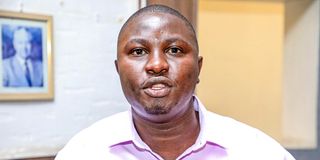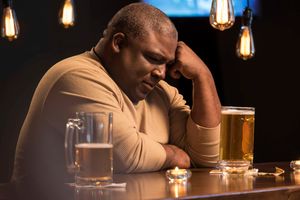
The problem with the lone-ranger method of dropping addiction is that the process is more than just parting ways with a drug.
For 20 years, Elizabeth Ndolo could not help herself when it came to drinking alcohol. She could not go a day without gulping down liquor.
In her house, there was always a stock of booze. At times she would go to a bar to drown her sorrows. One night, she remembers, she came home so drunk that she fell asleep on the toilet seat.
“In the morning, I was like, ‘Wait a minute, how did I find myself here?’ But the sleep was nice, very peaceful,” she says with a chuckle.
She breastfed one of her children for not more than three months “due to the rocky stuff that I was going through”.
“The milk disappeared,” sighs Elizabeth, who is in her early 40s.
However, she notes, she always hid from her children when drinking.
“I would lock myself in my room and sit there,” she remembers.
All this started with one sip around 2003 when she was in her early 20s. As the addiction picked up, she required alcohol in large quantities to get high.
“If it’s wine, in one sitting, I could do three bottles and sometimes I would still be looking at you and feeling nothing. Until a friend of mine told me, ‘Hey, Liz we ni hasara (You’re a high-maintenance woman),” she recalls.
Never mind that, at the height of her addiction, she was a housewife. She had quit her job when she got married.
Asked how she funded her drinking habit, she says: “Money for that is always there. And it’s always enough.”
Then things changed one day.
One of the factors for her transformation, she says, was because she had enrolled for an online psychology course. The more she read, the more she confronted the demons within her that had driven her to alcoholism.
“It happened that, slowly, my conscious and my subconscious had a discussion,” she says. “During that conversation, which I partly knew about, I started feeling like I should love myself more; I should engage in things that are positive; I should put on a positive mindset and I should look at the brighter picture and the positive side of life.”
Then came the day she took her final sip of alcohol. She remembers that it was in September 2023. She chose to take the most bitter of the ones at her disposal “to show probably the state of my mind”.
This was numerous months into her online course.
“I found myself telling myself that I will not be able to continue with this lifestyle anymore,” she remembers.
“It was not easy. Initially, I thought I’ll just slide back into it, but during that online course, I happened to discover who I am. I think I was lost in so much pain that in the process of the course, I let go of so many things. There are different things behind why people do what they do. I think my reason for using the bottle was to avoid pain. I had been in so much pain since my childhood; many things that are unspoken,” adds Elizabeth.
As she speaks with Nation Lifestyle in an interview on a hot Friday afternoon, she is beaming and optimistic. She is clearly a woman on the mend, hoping her story can inspire others to rise above addiction.
“It’s always not easy to face reality. But the first question should be: ‘Why am I doing this?’” she says to those who may want to quit alcohol like she did.
She says her turning point was when she let go of the baggage that was weighing her down.
“I’m sure all of us have a history of hurt in one way or another,” says Elizabeth. “All those people who contributed to hurting me, I let go of them and I forgave them. And I also forgave myself.”
She marked one year of sobriety in September 2024, and some of her friends hardly believe her when she says she parted ways with alcohol.
“The journey has been smooth,” says the mother of two. “I’ll not say stress has stopped. Stress will always be there. And I’ll not say I’ve not been tempted to go back to the bottle. It has happened, but it’s all about self-discipline, focus and determination as well as looking at the pros and cons of everything.”
Despite her upheavals, her marriage did not disintegrate during her years in the pits of alcoholism, and her children are now in their teens.
“I met someone who asked me, ‘OK, you stopped drinking. So where do you take that energy?’ I told him I go to the gym, I do sauna, I do swimming. I take morning and evening walks, and I also do some me-time: meditation and all that. It has really helped me. Today, I feel very confident. My body feels much better,” she says. Having finished her psychology studies, Elizabeth – who is a businesswoman – wants to venture into counselling and life coaching “so that I can help people through all these things”.
“There are many people who are drinking not because they want to drink, but because life has pushed them to that extent,” she says.
Her manner of quitting the bottle without the intervention of a rehabilitation centre or therapist is called “white-knuckle sobriety” by those in the addiction counselling space.
Elizabeth’s opinion of rehabs is that they are only helpful if the addict is willing.
“If you force me to do something, I might do it, but it might be counterproductive. If I choose to do something, I will do it and it might be successful,” she says. “You could be thinking of me like you want to take me to a rehab for instance, and you’re like that’s the only place I can be helped. But have you talked to me? Did you even hear my story? And that’s the first thing we need to do; let’s understand somebody.”
On whether she considered enrolling at a rehab, she says: “I’m the kind of person who has grown up and dealt with my life. I’ve faced so many things on my own. So, on this one I was also like ‘mhh; I can also do it,’” she says.
Elizabeth grew up in a family that eschewed alcohol. She remembers her mother reading her a Bible verse that says alcohol is for the dying (Proverbs 31).
“All this period, it never sank. It never crossed my mind until the other day that I laughed it off,” she says. Her foray into alcoholism began when she got her first job.
“I was out with my colleagues at work. So, we decide: let’s go have one. And then we went and had one, and it was fun,” she recalls.
Then, the hidden pain in her, which she is not ready to divulge, soon drove her into dependency.
“A year later (after her first experience with alcohol), I got married. I think that’s when things now took a different twist,” she says, explaining how she later became an alcoholic housewife.
“Five years into marriage, I had two kids. I think this rattled every part of me, because I had to be sober for my children. But the soberness that I chose was the drink. It’s the one that made me sober, because if I was not sober and I was hurting inside, I’d be very angry with these children and beat them very easily. So, I would drink my stuff and calm down. And I loved that feeling because I couldn’t shout at my children, I couldn’t beat them,” she recalls.
Another wake-up call for her, she says, was when she was in a pub and a man approached her to ask her about her “body count”, to mean the number of men she has been with.
“I think it threw me back to factory settings,” she says, noting that as much as she was into alcohol, she stayed away from promiscuous conduct.
“People judge you for what they do not know,” she says.
Mr Humphrey Agevi, a psychologist working with the Nairobi's Karen branch of the Asumbi Treatment Centre, a church-run addiction counselling institution, says it takes extraordinary resolve for a person to drop addiction without engaging a therapist. It requires high discipline, he says, and extraordinary motivation. He theorises that perhaps one in 50 people can quit addiction on their own.
“White-knuckle sobriety refers to people seeking recovery through their own sheer willpower, without having to get any professional help,” he says.
Sometimes, Mr Agevi says, the transformation happens when the addict gets a near-death experience, an illness “or just any other turning point that informs them to see that they have a problem”.
“The method is not easy compared to the one that is recommended — that when someone has a problem, they need to go to seek help from professionals,” he adds.
The problem with the lone-ranger method of dropping addiction, Mr Agevi says, is that the process is more than just parting ways with a drug.
“Recovery needs to be holistic. The first challenge addicts usually face is navigating through withdrawal symptoms,” he says. “In a facility, clients are guided on how to work on the withdrawal symptoms.”
“When someone abruptly stops, there’s also the issue of even going through a depressive episode as the system is readjusting and coming back to normal. So, that makes it a bit complicated…There are isolated cases of people who have been able to effectively stop on their own. But it is a very, very hectic process which I could compare to a roller-coaster,” he adds.
Given such factors, Mr Agevi warns that a person who chooses sobriety on their own may not toe the line for more than a year.
He knows of a case in which a person who was trying to quit alcohol lost his mind.
“The withdrawal symptoms became so severe that he had a psychotic episode that made him … end up hurting himself,” he said.
Addiction problems like alcoholism, Mr Agevi explained, thrive among impulsive people, who have unstructured routines, and who have underlying problems — especially those related to mental health.
“This is a disease that is characterised by compulsivity, obsession, loss of control, and even a bit of denial,” he says.
“There is a concept called dry drunk, such that somebody can be recovered; yes, they’re not using alcohol, but they’re still exhibiting behaviours that fit the profile of an addict. So, they just stopped using alcohol, but they are still behaving like addicts. They are focusing less on self-care, unable to engage in meaningful activities like seeking a job or going back to school, and still have mental health issues like anger issues,” he adds.

Humphrey Agevi a psychologist during the interview at Nation Centre on February 20, 2025.
That is why he encourages whoever is attempting to quit drugs to join groupings like Alcoholics Anonymous for support.
“These are groups that will require them to attend meetings once in a while so that they seek support from other recovering addicts,” he says.
Going into exercise like in Elizabeth’s case to get an alternative “high”, he says, can be helpful.
“One of the things that can contribute to recovery is having a cause; finding a way to contribute to life. That could include people going back to school. People could also look for a job, look for a meaningful activity to engage in because addiction thrives in unstructured life. Recovery works well with a certain structure,” says the psychologist.
In all, Mr Agevi insists on seeking help — either by going to a rehab or getting an individual therapist.
“Some people think addiction is a moral failure; others think that somebody can just wake up and say ‘enough is enough’. No, this is a disease that also is characterised by compulsivity, obsession, loss of control, and even a bit of denial. Denial is part of the disease that tells them that they have no disease. When they go through this disease, the whole system sometimes is affected, and that’s why even the medical aspect has also to be taken into consideration,” he argues.
Mr Agevi also advises that a recovering addict should never try to “step down” into being an occasional drinker.
“For normal users, they can go to a club, take one and go home. But for addicts, they don’t have the power to stop. That’s why there is the slogan that one is too many. They go there to have one but then they end up having a couple of bottles,” he says.






